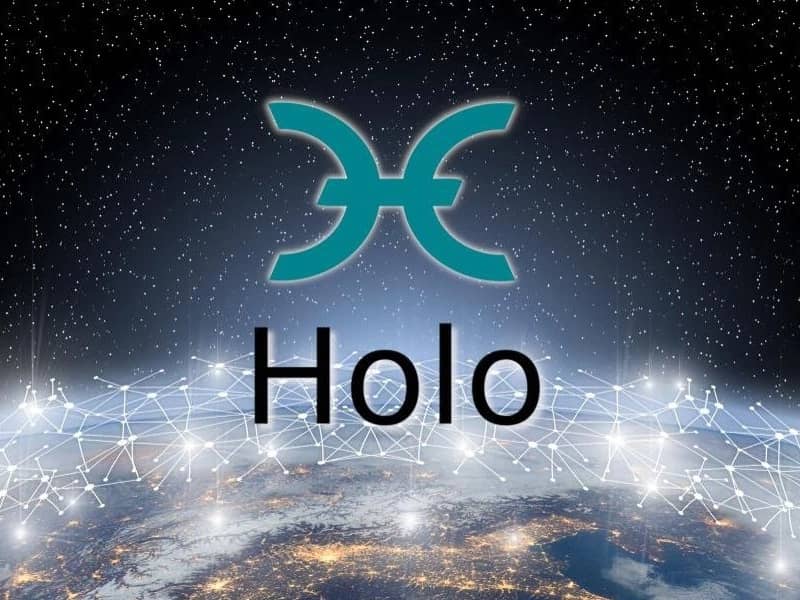Subscribe to wiki
Share wiki
Bookmark
Holo (HOT)
The Agent Tokenization Platform (ATP):Build autonomous agents with the Agent Development Kit (ADK)
0%
Holo (HOT)
Holo (HOT) is a cryptocurrency that operates within the Holo ecosystem, facilitating transactions and serving as an intermediary before the full implementation of HoloFuel. Holo provides a decentralized hosting network that enables Holochain-based applications to be accessed through conventional web browsers. Holochain is a peer-to-peer (P2P) framework for decentralized application (DApp) development that differs from blockchain by employing an agent-centric model aimed at improving scalability and efficiency. [1] [2]
Overview
Holo functions as an intermediary layer that allows access to Holochain applications without requiring users to install additional software. The blockchain operates through a distributed hosting model, where participants contribute spare computing resources to support Holochain-based applications. This decentralized architecture enhances scalability and accessibility for distributed applications. [2]
History
Holo was established in 2016 by Arthur Brock and Eric Harris-Braun as part of the MetaCurrency Project, a broader initiative focused on peer-to-peer economic tools. The project's foundations were influenced by Ceptr, a cooperative P2P framework previously developed by the founders. The Holo Initial Community Offering (ICO) took place in 2018, issuing the HOT token as a temporary exchange mechanism before the transition to HoloFuel.
Since its inception, Holo has undergone various phases of development, including the release of HoloPorts, specialized hardware designed for hosting Holochain applications. The project has also conducted alpha and beta testing of its ecosystem and currency model to refine its infrastructure before full-scale implementation.
Technology
Holo's infrastructure relies on a distributed cloud hosting framework, where participants, referred to as hosts, allocate computing power and storage in exchange for HoloFuel. The platform employs a validating distributed hash table (DHT), allowing each node to enforce data validation rules locally. Unlike blockchain, which requires all nodes to maintain a global ledger, Holochain enables nodes to store only a portion of the network’s data, reducing computational overhead and improving efficiency. [2]
Holochain Architecture
Holochain differs from blockchain-based architectures by eliminating the need for global consensus mechanisms. It enables each node to validate and manage its own data while maintaining overall network integrity through cryptographic signatures and peer validation. Holochain-based applications facilitate decentralized data ownership, reducing reliance on centralized entities.
The architecture consists of three primary components:
- Agent-Centric Model: Unlike blockchain’s data-centric approach, each node (agent) in Holochain maintains a personal immutable chain while storing and sharing only necessary data with the network.
- Validating Distributed Hash Table (DHT): Nodes verify transactions and interactions based on their local validation rules and propagate the information through a DHT rather than a single shared ledger.
- Peer-to-Peer Governance: The protocol allows for self-regulation and validation within smaller networks, reducing dependency on a single central authority.
HoloFuel & HOT
HoloFuel is the native cryptocurrency of the Holo network and operates as a mutual credit system designed for high-frequency microtransactions.
It differs from HOT in several ways:
- Accounting Model: Unlike HOT, which is an ERC-20 token, HoloFuel functions as an asset-backed accounting system that scales dynamically based on network usage.
- Stability: HoloFuel’s value is determined by hosting capacity rather than speculation, aiming for greater price stability. Holo’s token, HOT, is available on multiple cryptocurrency exchanges, including Binance and Probit. HOT acts as a placeholder for HoloFuel and will be gradually phased out upon full network implementation. [5] [6] [7]
Governance and Community
Holo follows an open-source governance model, allowing community members and developers to contribute to the project. While initial development was led by Holo Ltd., the project aims to transition to a more decentralized governance as DAO framework. Future governance mechanisms may include a combination of community-driven decision-making and automated regulatory frameworks.
Security and Data Integrity
Holochain employs cryptographic signatures and distributed validation mechanisms to maintain data integrity. Each application establishes its own validation rules, and data is verified by peers before being distributed within the blockchain. This model reduces reliance on centralized data storage and eliminates the need for global consensus protocols.
Holochain differs from blockchain in several key areas:
- Consensus Mechanism: Holochain does not require global consensus, whereas blockchain relies on Proof-of-Work (PoW) or Proof-of-Stake (PoS) mechanisms.
- Scalability: Holochain distributes data across nodes through sharding, reducing the need for full ledger synchronization, which is a limitation in blockchain systems.
- Energy Consumption: Unlike blockchain, which often requires significant energy expenditures for mining operations, Holochain operates with lower computational costs.
- Computational Efficiency: Holochain's agent-centric approach enables localized validation, with the aim of making transactions more efficient compared to blockchain-based systems.
Use Cases of Holochain
Holochain supports a variety of decentralized applications, including:
- Social Networking: Platforms that operate without centralized control, allowing users to retain ownership of their data.
- Supply Chain Management: Systems that facilitate shared data access across multiple entities to improve efficiency and transparency.
- Peer-to-Peer Marketplaces: Decentralized platforms enabling direct transactions between users without intermediaries.
- Governance and Decision-Making: Collaborative frameworks that facilitate decentralized governance models.
- Collaborative Tools: Applications such as wikis, scheduling tools, and discussion forums that operate without centralized oversight.
Future Developments
Holo's future development includes several key milestones:
- Beta Testing of HoloFuel: Continued testing and refinement of the HoloFuel economy.
- Expansion of Hosting Capabilities: Increasing network participation and onboarding more hosts.
- Integration with Web3 Technologies: Exploring compatibility with other decentralized protocols.
- Decentralization of Governance: Transitioning towards a more community-driven governance structure. Holo and Holochain provide an alternative to conventional blockchain. By enabling peer-to-peer hosting without centralized intermediaries, Holo aims to facilitate broader access to decentralized applications while maintaining a more sustainable and efficient computational model. [1] [2] [7] [8]
See something wrong?
The Agent Tokenization Platform (ATP):Build autonomous agents with the Agent Development Kit (ADK)
